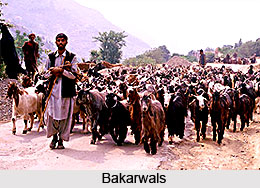 Gujjar Bakarwals in India are spread throughout the northern part of the Himalayan Range. This includes the states of Uttarakhand, Himachal Pradesh and Punjab. In Pakistan, Bakarwals are found in the hilly northern parts of Punjab as well as parts of the North West Frontier Province. In Jammu and Kashmir in India, Bakarwals are also found in all the three regions of the state including Jammu (comprising districts of Jammu, Kathua, Udhampur, Poonch, Rajouri Districts), the Kashmir Valley (comprising the districts of Srinagar, Baramulla, Kupwara, Pulwama, Budgam and Anantnag) and Ladakh (comprising Kargil). The two groups that are Gurjars and Bakarwals of Jammu and Kashmir are closely associated.
Gujjar Bakarwals in India are spread throughout the northern part of the Himalayan Range. This includes the states of Uttarakhand, Himachal Pradesh and Punjab. In Pakistan, Bakarwals are found in the hilly northern parts of Punjab as well as parts of the North West Frontier Province. In Jammu and Kashmir in India, Bakarwals are also found in all the three regions of the state including Jammu (comprising districts of Jammu, Kathua, Udhampur, Poonch, Rajouri Districts), the Kashmir Valley (comprising the districts of Srinagar, Baramulla, Kupwara, Pulwama, Budgam and Anantnag) and Ladakh (comprising Kargil). The two groups that are Gurjars and Bakarwals of Jammu and Kashmir are closely associated.
Bakarwal is derived from the Hindi/Urdu/Punjabi/ Kashmiri/ Dogri terms, Bakri/Bakar meaning `goat /sheep` and wal meaning `one who takes care of`. Basically, the name in `Bakarwal means `high-altitude goatherds/shepherds`. Bakarwals lead a lonely and tough life in the high-altitude meadows of the Himalayas. Every year, the Bakarwals take their sheep high into the mountains, above the tree-line to graze in the lush meadows. It may take them as many as sixty days to reach these meadows. During the summer, they move from one meadow to the other. The Bakarwal tribes generally travel in pairs but generally at times they prefer to go alone or in larger groups. Most of the time, they are accompanied by their dogs, which include the famous bhotia dogs and other animals.
Bakarwals are known as Dhangar in the rest of India. The Bakarwals (Dhangars) belongs to the same ethnic stock as the Gurjars, and inter-marriages freely take place among them. Bakarwals have same gotra clan like Gurjars, many local shepherds, who may not necessarily belong to the community, are often termed as Bakarwal. They according to the historians initially belong to Rajputana region of Kathiawad. Moreover, Bakarwals are considered as backward and less educated. Bakarwal community has their own Gujri language, which they use for speaking. One of the wonderful aspects of the ancient belief associated with them states that the Bakarwals often remain free from several water borne diseases. They are essentially considered as a brave and hardy race, the Bakarwals have undertaken several adventures that won them laurels on the battleground.




















